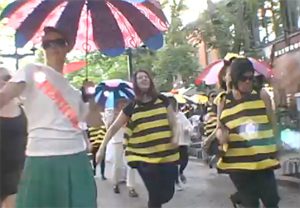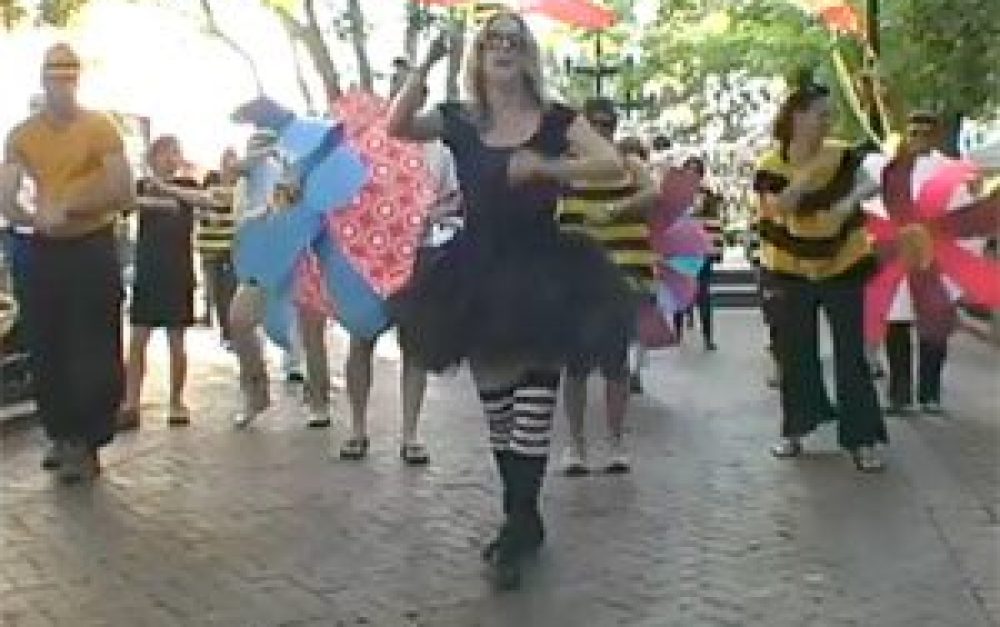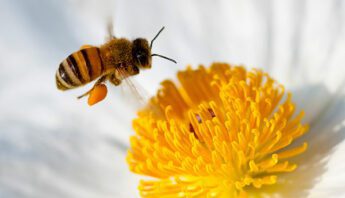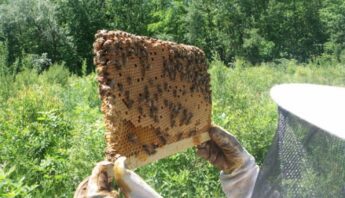I have never been an organizer. Tell me where the march is, and I’ll show up if I can.
But several months ago I got an e-mail forward from Graham White, a beekeeper in Scotland. It said something to the effect of: “Hey beekeepers, picture this: a flash mob for the bees!”
It went on to flesh out an awesome public scene, taking place at the same time on a given day, in several towns in France, Germany, Italy, the Netherlands, and the United States.
The scene Graham envisioned looked something like this: several people on stilts dressed up as grim reapers in long black coats that read Bayer, carrying CO2 fire extinguishers disguised as giant sprayers and labeled POISON. The grim reapers would tower above and wreak havoc on hundreds of small people dressed as flowers and bees. And the message, “Pesticides Kill Bees,” would ring out loud and clear, captured on the world media and displayed for the masses.
I loved the idea. Absolutely loved it. Became kind of obsessed with it, and so I took it to Coaltion4Bees, the tiny grassroots group I’m involved with here in Boulder County, Colorado. We decided to give it a whirl. We would call it a “Cause Mob.” But it was clear that if I really wanted it to happen, I would have to organize it. Yikes.
'Stayin' Alive,' in honeycomb sunglasses!
 We chose a Saturday evening on the Pearl Street pedestrian mall during National Pollinator Week. We put the word out far and wide — to beekeepers’ associations, gardening groups, pottery labs, coffee shops, dance studios. We made flowers out of umbrellas, stenciled the word “PESTICIDES” on t-shirts, and bought a handful of bee costumes. We found a seasoned flash mobber, who I call Flash Mob Lucy, who was happy to choreograph a dance to our chosen song, Stayin’ Alive. A member of our group, artist Theresa Beck, painted a big banner that read “Celebrate National Pollinator Week.” And another member, filmmaker Laura Tyler, volunteered to film the event.
We chose a Saturday evening on the Pearl Street pedestrian mall during National Pollinator Week. We put the word out far and wide — to beekeepers’ associations, gardening groups, pottery labs, coffee shops, dance studios. We made flowers out of umbrellas, stenciled the word “PESTICIDES” on t-shirts, and bought a handful of bee costumes. We found a seasoned flash mobber, who I call Flash Mob Lucy, who was happy to choreograph a dance to our chosen song, Stayin’ Alive. A member of our group, artist Theresa Beck, painted a big banner that read “Celebrate National Pollinator Week.” And another member, filmmaker Laura Tyler, volunteered to film the event.
When all of the logistics were in place, I was suddenly kind of terrified. I resigned to the possibility that no one would actually show up. And the possibility that no one on the streets of this town would care to stop and watch. And the possibility that we might just look like a tiny, sad group of bee freaks trying to be dramatic.
But lots of people showed up. People showed up with bells and whistles. Little people showed up. Silver-haired people showed up. People brought brilliant kites and honeycomb sunglasses and bee costumes they sewed for their children 26 years ago. People showed up who had learned of the event in thrift store lines (buying costume supplies!). Most moving, though, was that people showed up with huge enthusiasm and joy and loud voices to speak the truth.
The plan was to perform the dance mob twice. But such was our momentum and excitement that we ended up performing it five times, covering an area of about 6 blocks. We were fueled not only by our own exhilaration and solidarity, but also by the amazing public response. People on the streets did care to stop and watch, and many hollered “save the bees!”, “buy organic!”, “stop using pesticides!”, “I love pollinators!” right along beside us. A few even joined the dance. And walking back to our cars, we passed one of the spots where we had performed and saw that someone had chalked on the sidewalk “Save the Bees!”
Our flash mob did not involve grim reapers on stilts, hundreds of performers, or several sister performances the world over, but it was a pretty moving moment. It inspired me to join Graham White and dream big. Hey pesticide activists, picture this: An International Cause Mob for the Bees, National Pollinator Week, 2012.
————————-
Amy Fontenot is a PAN member in Longmont, CO. She is a backyard beekeeper, translator, and co-founder of Coalition4Bees, whose mission is to raise awareness about the harmful effects of pesticides on honeybees and other pollinators, and empower people to play a role in supporting these vitally important beings.







